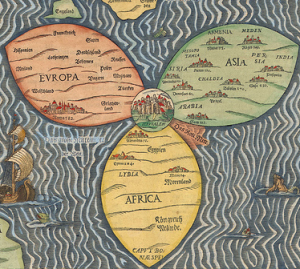Studying the biblical world view is one of my main fascinations. Everyday I ask, what did the Bible’s teachings mean to the people who first heard them?
Could twenty centuries of time and cultural change obscure some of its passages? The answer, to me, is an obvious “yes.” But at first I found this idea worrisome. Shouldn’t the Bible’s message be universally understandable? Why would God tuck his revelation away in an obscure corner of the ancient world, so that later it wouldn’t make sense to people?
 I found a fascinating answer to this question in Meaning Across Cultures, by Eugene Nida, a well-known figure in the world of Bible translation (Orbis, 1981). After a long career of translation projects around the globe, he concludes,
I found a fascinating answer to this question in Meaning Across Cultures, by Eugene Nida, a well-known figure in the world of Bible translation (Orbis, 1981). After a long career of translation projects around the globe, he concludes,
In a sense, the Bible is the most translatable religious book that has ever been written, for it comes from a particular time and place (the western end of the Fertile Crescent) through which passed more cultural patterns and out from which radiated more distinctive features and values than any other place in the history of the world. If one were to make a comparison of the culture traits of the Bible with those of all the existing cultures of today, … one would find that in certain respects the Bible is surprisingly closer to many of them than to the technological culture of the western world. It is this “western” culture that is the aberrant one in the world. And it is precisely in the western world, and in the growing number of persons in other parts of the world, that the Scriptures have seemingly the least ready acceptance.
Fascinating thought, isn’t it? That God did indeed put Israel at the crossroad of the world, so that the Scriptures have made great sense to people throughout history. It’s us modern Christians who struggle the most to grasp the biblical message.
If you think about it, many people throughout history and around the world have lived in large families, eeked out an existence by farming, and lived in the shadow of slavery, foreign oppression and war. In many traditional cultures, daily living has revolved around rituals of worship, and a child’s education has centered on learning stories of faith. With our individualism, secularism, materialism, and biblical illiteracy, we in the Western world are the ones who have moved farthest away from Jesus’ world. Could it be that we are the ones who have the most to learn?
Shauna says
Thank you Lois for these thoughts and the quote from Eugene Nida.
I too, am an avid student of the biblical world view and Hebraic perspectives of the Bible scriptures. I have read many of your articles online with En Gedi Resources Centre, as well as your own website here and have learned so much from you. As of yet, I still want to purchase your books, “Listening to the Language of the Bible” and “Sitting at the Feet of Rabbi Jesus.” Someday soon. 🙂
I commend you for your research, your knowledge, and your expertise in these areas and want to encourage you to continue to keep us informed with your “discoveries.”
Blessings to you and thank you so much. Your ministry has touched my life in a profound way and has deepened my studies and understanding of the scriptures and my walk with our Rabbi and LORD Jesus.
Ted M. Gossard says
Thanks so much, Lois. Wise words. And helpful. We need to humble ourselves and learn from others. Thankful to God for his grace in helping us in spite of our blindness. But it is a sobering word. And it makes me wonder just how we misapply it since we don’t see it well in context.
Ted M. Gossard says
…misapply God’s word, I mean.
Calvin says
I’m currently doing a School of Biblical Studies here in Taiwan and am finding that historical background brings so much richness and revelation to the text. This post was right up my alley 🙂
Gary says
I am a pastor who has been and still is fascinated by the cultural background of First Century Israel. My preaching and teaching have been highly improved since reading Sitting at the Feet of Rabbi Jesus. I recommend this book as required reading for all pastors and teachers!
Khongsngi Steve says
Dear Lois
Thank you so much for the articles which has been a great help for me in my teaching ministry. The depth and the background of the teaching of Jesus has helped me to see the gospels afresh and made me to enjoy studying the gospels much more.
May God help you to further your research and discoveries for the extension of His Kingdom and His glory.
Blessings
Kelsey says
I found your point about maybe it is actually the Western culture that has so much to learn very interesting. I do think that we have strayed very far away from where others are. We have become very materialistic and a secular culture. Thank you for this blog post! Very thought provoking.
Sara P. says
I believe we do still have a lot to learn about the culture Jesus lived in. I think the more we learn, the better we understand His teachings and what His audience would have heard Him say. Whenever I read the Bible and hear Jesus teaching, I am just blown away. It is outstanding, even to my western mind! I like to learn about the way the eastern culture thinks too. I think it is very valuable, and a key to understanding Jesus’ teaching. I want to keep growing in Christ everyday!
🙂